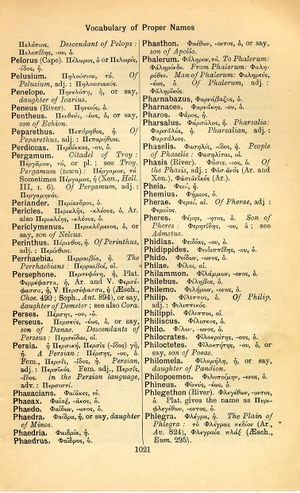Phalerum: Difference between revisions
Μέλλοντα ταῦτα. Τῶν προκειμένων τι χρὴ πράσσειν· μέλει γὰρ τῶνδ' ὅτοισι χρὴ μέλειν → Tomorrow is tomorrow. Future cares have future cures, and we must mind today.
(D_7) |
(Gf-D_7) |
||
| Line 1: | Line 1: | ||
{{WoodhouseENELnames | {{WoodhouseENELnames | ||
|Text=[[File:woodhouse_1021.jpg|thumb|link= | |Text=[[File:woodhouse_1021.jpg|thumb | ||
|link={{filepath:woodhouse_1021.jpg}}]]Φάληρον, τό. | |||
<b class="b2">To Phalerum</b>: Φάληρόνδε. | <b class="b2">To Phalerum</b>: Φάληρόνδε. | ||
Revision as of 07:44, 14 August 2017
English > Greek (Woodhouse)
Φάληρον, τό.
To Phalerum: Φάληρόνδε.
From Phalerum: Φαληρόθεν.
Man of Phalerum: Φαληρεύς, -έως, ὁ.
Of Phalerum, adj.: Φαληρικός.
Latin > English (Lewis & Short)
Phălērum: i, n., = Φαληρόν,
I the oldest harbor of Athens, connected with the city by a long wall, with a demos of the same name belonging to it, Plin. 4, 7, 11, § 24.— Hence,
A Phălēreus (mostly trisyl.), ĕi and ĕos, m., = Φαληρεύς, of or from Phalerum, a Phalerian: Demetrius Phalereus, or simply Phalereus, a ruler of Athens and a famous orator, about B. C. 300, Cic. Leg. 2, 25, 64; id. Fin. 5, 19, 54; id. Div. 2, 46, 96; Nep. Milt. 6, 4.—Scanned as a quadrisyllable: Demetrius, qui dictus est Phalereus, Phaedr. 5, 1, 1.—Acc.: Phalerea, Quint. 2, 4, 41; 10, 1, 80.—
B Phălērĭcus, a, um, adj., = Φαληρικός, Phalerian: portus, Nep. Them. 6, 1.—As subst.: Phălērĭcus, i, m. (sc. portus), = Phalerum, in Phalericum descendere, Cic. Fin. 5, 2, 5; cf.: in Phalerico, Plin. 2, 103, 106, § 225.

